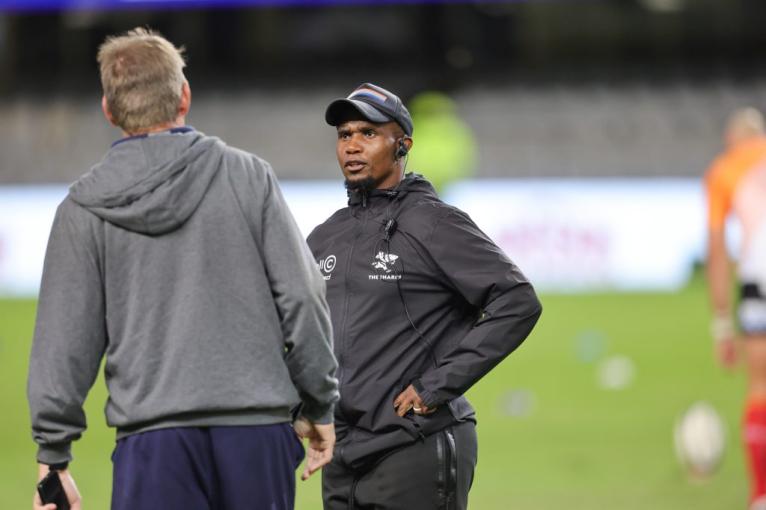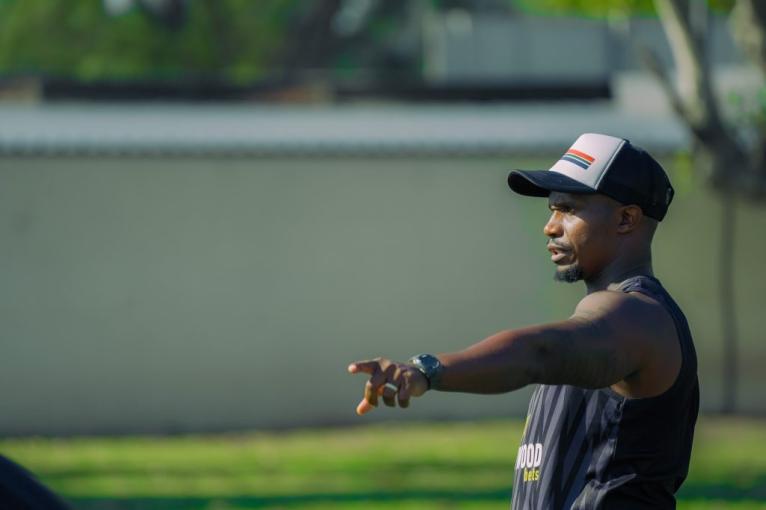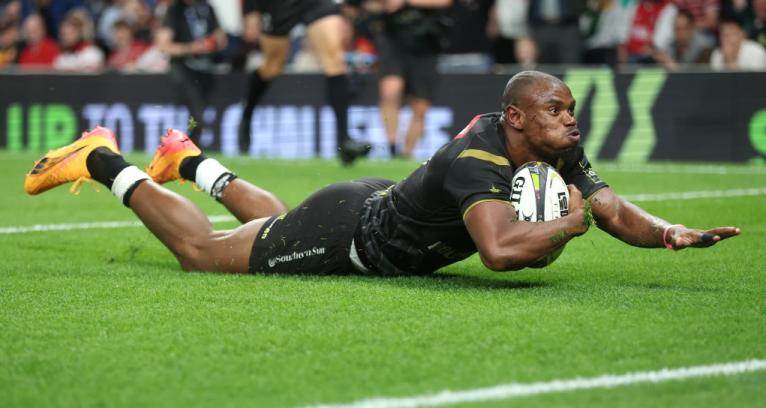In another life, Joey Mongalo, one of the hottest coaching properties in South African rugby, would be sitting behind a desk in a corporate marketing office. That he presides over a Springbok-laden Sharks defence and has coached at three of the nation’s biggest provincial beasts stands testament to his thirst for knowledge, emotional intelligence and a helping of fortune.
Mongalo’s career path was by no means preordained. His father died when he was seven. Growing up in Brits, an agricultural hub North West of Pretoria, he harboured little appetite for cricket or rugby, the two sports in which he would earn age-grade provincial and national honours. It wasn’t until his primary school teacher, Marius van Heerden, marched him out to the cricket nets sport became a very tangible part of his life.
“This dude just picks you out of nowhere and says, ‘come, let’s play cricket’. The first ball, you bowl over both the nets in front of you. He says, ‘no, you’re going to keep going’. In a year it went from couldn’t hold a cricket bat to a wicketkeeper/batsman, then I played provincial cricket two years later.

“After two more years he introduced me to rugby. We got our butts kicked by the Afrikaans schools because we were the only English school in the area but we kept going. He changed the trajectory of my life. My relationship with sport would have died back then as an 11 or 12-year-old. I wouldn’t have had this.”
Once an Under-21 World Cup finalist, Mongalo is softly-spoken but considered. He spends chunks of this interview scribbling notes so he can offer the most comprehensive answers to the questions asked. He speaks five of South Africa’s eleven official languages. He has coached at the Lions and Bulls before moving to Durban in 2022. He has a masters degree in psychology and away from rugby, runs Team IP3, a company providing effective leadership training and team cohesion strategy to an array of corporate organisations.
A deep thinker, he’s had plenty to ponder these past 12 months. The Sharks lurched from defeat to defeat at the start of the URC season, falling even at lowly Zebre Parma, who had not won in well over a year. New coach John Plumtree was in the crosshairs. The reintegration of their Springbok heavies was not seamless, and only during the final throes of the campaign did they begin to purr. The improvement culminated in an evisceration of Gloucester in the Challenge Cup final, a performance dripping with defensive snarl which won Mongalo many plaudits.
In my defensive strategy meeting, it’s Eben Etzebeth, Vincent Koch, Lukhanyo Am, Makazole Mapimpi, Jaden Hendrikse – it’s a mini-Bok team.
“These guys were just desperate to win and they showed desperate actions,” he says. “The way they go about their business shows a care, they do things they shouldn’t be able to physically.
“Being a defence coach is thankless sometimes – when you win, you clap hands for the attack and when you lose it’s always down to one side.
“This season would be a great lesson for corporates and other teams; I’m going to do an online course on it. When you find your identity, purpose and process as a team, you start to fire.
“Change management is such an underrated thing in sport. We assume we’ll make a change, announce it in the paper and things will work. But we had a new head coach, new assistants who had never worked together, a new playing group and playing style – that is the hardest change management situation I’ve ever been in.”
So how do you coach two-time world champions? What can you teach them that they haven’t already learned? And when Jacques Nienaber’s iron curtain was so vital to their glory, what new nuggets can another defence specialist bring to the table?
“Everywhere I’ve coached before, the coaches are the knowledge base handing the knowledge down,” Mongalo says. “In my defensive strategy meeting, it’s Eben Etzebeth, Vincent Koch, Lukhanyo Am, Makazole Mapimpi, Jaden Hendrikse – it’s a mini-Bok team sitting in front of me. It would be foolish of me to think I can just regurgitate wisdom to them.

“I try to simplify as much as possible and not coach them a whole lot of things. I said to Vincent Koch, ‘if you can defend the ball on your inside shoulder, the rest doesn’t matter, we’ll figure it out as we go along’. Then I’ve got a connection point, next time we see each other we discuss how that point is going. They’re good enough players to figure the rest out, they don’t need me to help teach them what defence is about.
“You get rapport when the guys suggest things and there’s an ability to acknowledge, ‘okay, that’s something new, I didn’t know that’. There’s a vulnerability you have to have in that space.
“And relationally, if you can go a bit deeper than the surface – everyone knows them as these superheroes, which they are, but how can you get to know them a bit more personally? What are their kids doing? Can they play a round of golf? Then you can unearth a lot more out of people’s performances, whether they’re Springboks or have only played one or two games.”
The great tenet of the Springboks is its blend of beliefs, ethnicities and languages; its unifying of so many backgrounds and struggles and personalities around one shared objective. Mongalo has spent time in Rassie Erasmus’ environment and coached South Africa A, and his Sharks group has a similarly diverse makeup.
Honesty is the biggest lesson I learned from Rassie. He is the most honest person I know, in a group setting.
“I hate the world culture, it’s so overused. I’d rather speak about custom. What’s the custom of the area? How do we do things here? We go from Christian music to Xhosa music to Zulu music, it’s all welcome here because it’s within some kind of form where the freedom happens.
“I think language is so powerful. It’s one of the biggest ways to connect with people. I’m a Tswana-speaking guy so when I got here I tried to engage in Zulu and Xhosa which are spoken more in Durban. I still suck but the guys see I am trying. I can speak English through schooling and in Pretoria I did a lot of stuff in Afrikaans. It’s also just connecting with players again, how you help them perform their primary roles.
“With the Boks, I saw how Rassie is the psychologist of the team. He gives them the mindset they should have for the week. Every team has a psyche – it’s going to be 30 individuals or one collective psyche.
“Honesty is the biggest lesson I learned from Rassie. He is the most honest person I know, in a group setting. If you are honest and show genuine care, people want to work with you. You can have all the wisdom, knowledge, technical detail but if the relational detail doesn’t exist… People sometimes get freaked out by relational stuff thinking it’s soft. It’s not. The better you relate, the harder you can be on people.
“The actual rugby coaching, everyone can do that. The higher up you go, the coaches who connect with the guys get the best out of them and are doing well.”
Part of Erasmus’ previous role as the country’s director of rugby was to develop the next crop of coaches. South Africa is a complex country with an even more complex history but Erasmus acknowledged in 2022 “a number of black coaches with the potential failed to receive opportunities to coach at the highest level”. Mongalo, already Jake White’s defensive guru at the Bulls by then, was one of 18 earmarked for the union’s fast-track programme. The pathway has been improved, but perceptions linger, though Mongalo wants no part of them.
“I’ve actually never put colour to my coaching,” Mongalo says. “Brits is a deeply rooted Afrikaans town. I was always a minority guy involved in predominantly white sports – cricket and rugby. I see colour, but I’ve never viewed myself as that.

“I’ve viewed it as a competition. Regardless of what people look like, it’s a race. Whether your race is easier than somebody else’s doesn’t matter. It’s a race and you’ve got to win it. I’ve got to do whatever I can to win. By winning that race I’m almost cutting off whatever could be a distraction, whether another guy is wealthier or has a better pathway. I don’t even go there because then I’m weak.
“I’ve had to swim in high-performance waters my whole life. When I was 13, I got into a car and drove over an hour to go to Pretoria High on a performance bursary. I had to do well academically, pass exams and play on the A teams to keep my bursary. It wasn’t a freebie. I had a job to do to stay in the prestigious school for five years.
“Outside of that, what really matters? When you get older and in the age of social media you start to read things and ask if they are true. I’m more aware of that world and because of that I’m able to be a better friend and have better, open conversations around this. But I don’t think it’s changed what I see. That is too deeply ingrained in me.”
Mongalo has endured more personal strife beyond any chat about the colour of his skin. He was convicted of indecent assault while touring Australia with the Lions in 2018 and spent 20 months trying to clear his name. The conviction was eventually overturned on appeal and Mongalo cleared of all charges, but the prolonged legal machinations stained his reputation and cost him his contract.
People outside could say, ‘you’re a s**t coach, what are you doing?’ But if you know the truth, you shut out the white noise.
“I’m glad you brought it up,” he says, when the matter is raised. “I don’t want it to be the elephant in the room wherever I go. It’s a matter of truth, with those in my inner circle.
“The whole thing was a farce from the beginning; a baseless accusation. I was able to have a conversation with people who mattered to me, laid it straight that none of it is worthy of being concerned about.
“I was not going to let an accusation define who I was and what I stood for. Can you imagine if people walked around being tagged and defined by what others accused them of? The world would a peculiar place.
“It’s helped a lot in terms of coaching. You can only control what you can, make sure the people under your care, who love and trust you, are sorted and everything else is white noise. That’s what coaching is. You are busy with a process nobody else knows about. People outside could say, ‘you’re a s**t coach, what are you doing? You’re not getting it right.’ But if you know the truth, you go on with that and shut out the white noise. You can’t allow yourself to be dictated to by people who weren’t there and don’t know the intricacies of your environment.”
Mongalo’s ultimate ambition is to be a quiet consultant, a Wayne Smith type who helps head coaches sculpt environments and engender buy-in. Before that, he wants to lead teams himself. His successful stint in charge of the Sharks’ Currie Cup squad last year was a fine start.

“If you are an assistant coach you always get ideas about how you would run a team one day and when you actually get to do it and the stuff works, it’s like an insatiable sensation, it needs more. You want more.”
And still he pays tribute to Marius van Heerden, the schoolteacher turned surrogate father who set him on his way.
“Maybe I didn’t mourn my dad as much as I should have done. Maybe sport got me going. I mourned by ingraining myself in other things. It’s only now as an adult I think, imagine I had a father to ask about A, B and C. Which house would he buy? Where would he live? How would he think about stocks?
“God used Marius to literally change the whole course of my life. Because of that I got the chance to go to Pretoria Boys, a chance to play for the Bulls, I got to study. I sent him a message on Father’s Day to say thank you for the impact on my life.”


Comments
Join free and tell us what you really think!
Sign up for free